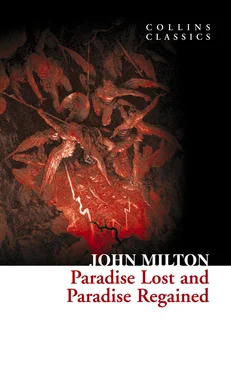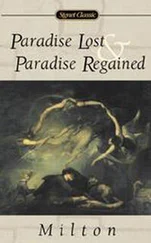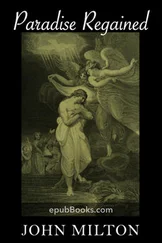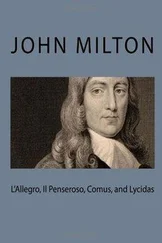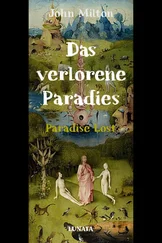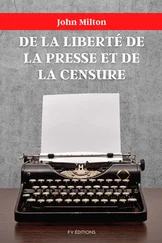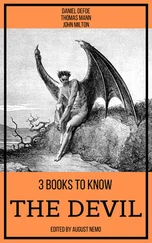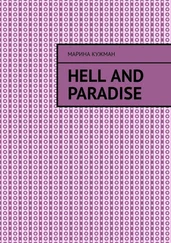Round he surveys (and well might, where he stood
So high above the circling canopy
Of night’s extended shade,) from eastern point
Of Libra to the fleecy star that bears
Andromeda far off Atlantic seas
Beyond the horizon; then from pole to pole
He views in breadth, and without longer pause
Down right into the world’s first region throws
His flight precipitant, and winds with ease
Through the pure marble air his oblique way
Amongst innumerable stars, that shone
Stars distant, but nigh hand seemed other worlds;
Or other worlds they seemed, or happy isles,
Like those Hesperian gardens famed of old,
Fortunate fields, and groves, and flowery vales,
Thrice happy isles; but who dwelt happy there
He staid not to inquire: Above them all
The golden sun, in splendour likest Heaven,
Allured his eye; thither his course he bends
Through the calm firmament, (but up or down,
By center, or eccentric, hard to tell,
Or longitude,) where the great luminary
Aloof the vulgar constellations thick,
That from his lordly eye keep distance due,
Dispenses light from far; they, as they move
Their starry dance in numbers that compute
Days, months, and years, towards his all-cheering lamp
Turn swift their various motions, or are turned
By his magnetic beam, that gently warms
The universe, and to each inward part
With gentle penetration, though unseen,
Shoots invisible virtue even to the deep;
So wonderously was set his station bright.
There lands the Fiend, a spot like which perhaps
Astronomer in the sun’s lucent orb
Through his glazed optic tube yet never saw.
The place he found beyond expression bright,
Compared with aught on earth, metal or stone;
Not all parts like, but all alike informed
With radiant light, as glowing iron with fire;
If metal, part seemed gold, part silver clear;
If stone, carbuncle most or chrysolite,
Ruby or topaz, to the twelve that shone
In Aaron’s breast-plate, and a stone besides
Imagined rather oft than elsewhere seen,
That stone, or like to that which here below
Philosophers in vain so long have sought,
In vain, though by their powerful art they bind
Volatile Hermes, and call up unbound
In various shapes old Proteus from the sea,
Drained through a limbeck to his native form.
What wonder then if fields and regions here
Breathe forth Elixir pure, and rivers run
Potable gold, when with one virtuous touch
The arch-chemic sun, so far from us remote,
Produces, with terrestrial humour mixed,
Here in the dark so many precious things
Of colour glorious, and effect so rare?
Here matter new to gaze the Devil met
Undazzled; far and wide his eye commands;
For sight no obstacle found here, nor shade,
But all sun-shine, as when his beams at noon
Culminate from the equator, as they now
Shot upward still direct, whence no way round
Shadow from body opaque can fall; and the air,
Nowhere so clear, sharpened his visual ray
To objects distant far, whereby he soon
Saw within ken a glorious Angel stand,
The same whom John saw also in the sun:
His back was turned, but not his brightness hid;
Of beaming sunny rays a golden tiar
Circled his head, nor less his locks behind
Illustrious on his shoulders fledge with wings
Lay waving round; on some great charge employed
He seemed, or fixed in cogitation deep.
Glad was the Spirit impure, as now in hope
To find who might direct his wandering flight
To Paradise, the happy seat of Man,
His journey’s end and our beginning woe.
But first he casts to change his proper shape,
Which else might work him danger or delay:
And now a stripling Cherub he appears,
Not of the prime, yet such as in his face
Youth smiled celestial, and to every limb
Suitable grace diffused, so well he feigned:
Under a coronet his flowing hair
In curls on either cheek played; wings he wore
Of many a coloured plume, sprinkled with gold;
His habit fit for speed succinct, and held
Before his decent steps a silver wand.
He drew not nigh unheard; the Angel bright,
Ere he drew nigh, his radiant visage turned,
Admonished by his ear, and straight was known
The Arch-Angel Uriel, one of the seven
Who in God’s presence, nearest to his throne,
Stand ready at command, and are his eyes
That run through all the Heavens, or down to the Earth
Bear his swift errands over moist and dry,
O’er sea and land: him Satan thus accosts.
“Uriel, for thou of those seven Spirits that stand
In sight of God’s high throne, gloriously bright,
The first art wont his great authentic will
Interpreter through highest Heaven to bring,
Where all his sons thy embassy attend;
And here art likeliest by supreme decree
Like honour to obtain, and as his eye
To visit oft this new creation round;
Unspeakable desire to see, and know
All these his wonderous works, but chiefly Man,
His chief delight and favour, him for whom
All these his works so wonderous he ordained,
Hath brought me from the quires of Cherubim
Alone thus wandering. Brightest Seraph, tell
In which of all these shining orbs hath Man
His fixed seat, or fixed seat hath none,
But all these shining orbs his choice to dwell;
That I may find him, and with secret gaze
Or open admiration him behold,
On whom the great Creator hath bestowed
Worlds, and on whom hath all these graces poured;
That both in him and all things, as is meet,
The universal Maker we may praise;
Who justly hath driven out his rebel foes
To deepest Hell, and, to repair that loss,
Created this new happy race of Men
To serve him better: Wise are all his ways.”
So spake the false dissembler unperceived;
For neither Man nor Angel can discern
Hypocrisy, the only evil that walks
Invisible, except to God alone,
By his permissive will, through Heaven and Earth:
And oft, though wisdom wake, suspicion sleeps
At wisdom’s gate, and to simplicity
Resigns her charge, while goodness thinks no ill
Where no ill seems: Which now for once beguiled
Uriel, though regent of the sun, and held
The sharpest-sighted Spirit of all in Heaven;
Who to the fraudulent impostor foul,
In his uprightness, answer thus returned.
“Fair Angel, thy desire, which tends to know
The works of God, thereby to glorify
The great Work-master, leads to no excess
That reaches blame, but rather merits praise
The more it seems excess, that led thee hither
From thy empyreal mansion thus alone,
To witness with thine eyes what some perhaps,
Contented with report, hear only in Heaven:
For wonderful indeed are all his works,
Pleasant to know, and worthiest to be all
Had in remembrance always with delight;
But what created mind can comprehend
Their number, or the wisdom infinite
That brought them forth, but hid their causes deep?
I saw when at his word the formless mass,
This world’s material mould, came to a heap:
Confusion heard his voice, and wild uproar
Stood ruled, stood vast infinitude confined;
Till at his second bidding Darkness fled,
Light shone, and order from disorder sprung:
Swift to their several quarters hasted then
The cumbrous elements, earth, flood, air, fire;
And this ethereal quintessence of Heaven
Flew upward, spirited with various forms,
That rolled orbicular, and turned to stars
Читать дальше
